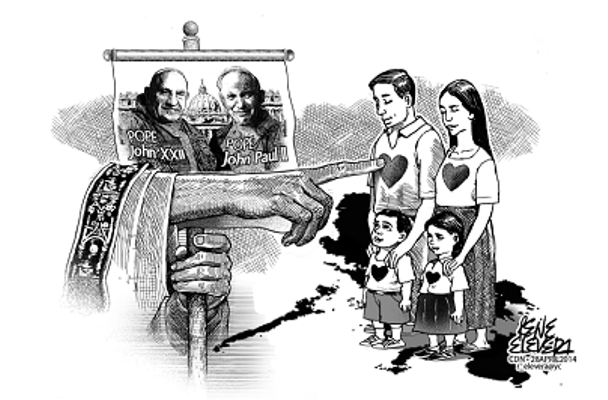The influence of the newly canonized saints John XXIII and John Paul II extended beyond the Catholic Church that they shepherded as popes at different periods in history.
We do not have the space to treat exhaustively the impact of their leaderships’ voluminous works; John Paul alone reigned as pontiff for over a quarter of a century and wrote more than 40 encyclicals apart from other papal documents and non-magisterial literary works.
But can we look to them today as leaders who struggled for a better world from different yet convergent loci: Saint John worked on a global canvas, establishing dialogue between the Church and the modern world in convoking the Second Vatican Council.
(That council was significant for the Church in the Philippines, says the theology professor James Kroeger, because it was the first in history where ethnic Filipino bishops participated. In fact, a Filipino delegate, Archbishop Rufino Cardinal Santos of Manila was a leading voice in conciliar discussions on the Blessed Virgin Mary.)
Saint John Paul, on the other hand, did not spark an event as big as a council that calls to Rome all bishops in the world, but it was during his pontificate that the Church started to invest more in pastoring followers through global meetings like the World Youth Day and World Meeting of Families.
No Filipino alive during Saint John Paul’s visits will forget him. If only for creating the occasion for the composition of the song “Tell the World of His Love”, the theme of the World Youth Day held in Manila in 1995, young Filipinos at the time hold a special place for the Polish pope in their life of faith.
“Pacem in Terris (Peace on Earth)” is perhaps Saint John’s most popular encyclical and its message continues to be relevant to nations and leaders today.
“Hence, among the very serious obligations incumbent upon men of high principles,” Saint John said, “We must include the task of establishing new relationships in human society, under the mastery and guidance of truth, justice, charity and freedom—relations between individual citizens, between citizens and their respective States, between States, and finally between individuals, families, intermediate associations and States on the one hand, and the world community on the other.”
On the other hand, “Evangelium Vitae (The Gospel of Life)” may well be Saint John Paul’s most important encyclical, emphatic as it is in defense of human life.
“A society lacks solid foundations when, on the one hand, it asserts values such as the dignity of the person, justice and peace, but then, on the other hand, radically acts to the contrary by allowing or tolerating a variety of ways in which human life is devalued and violated, especially where it is weak or marginalized,” Saint John Paul wrote.
“Only respect for life can be the foundation and guarantee of the most precious and essential goods of society, such as democracy and peace.”
Let us honor the memory of these popes and saints by remembering their teachings in our pursuit of the good of all.
Disclaimer: The comments uploaded on this site do not necessarily represent or reflect the views of management and owner of Cebudailynews. We reserve the right to exclude comments that we deem to be inconsistent with our editorial standards.

